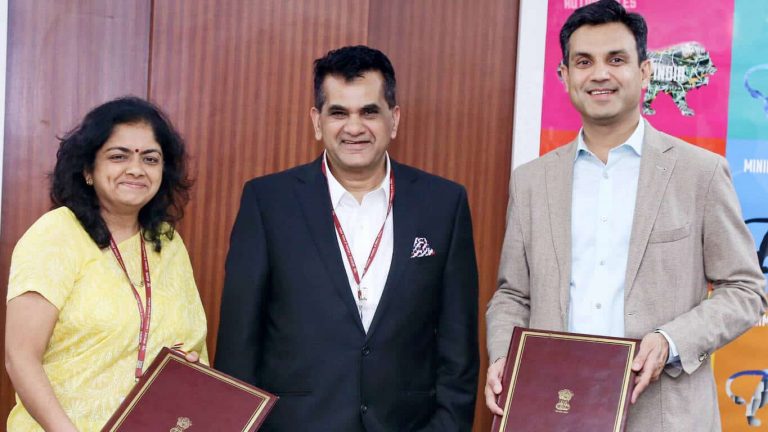NITI Aayog and Microsoft India have announced an agreement to leverage the benefits of AI for the growth of the nation.
The NITI Aayog, also National Institution for Transforming India, is a policy think tank of the Government of India, established with the aim to achieve Sustainable Development Goals and to enhance cooperative federalism.
As part of the agreement, Microsoft India will support NITI Aayog by combining the cloud, AI, research and its vertical expertise for new initiatives and solutions across several core areas to advance agriculture, healthcare, natural language computing, and a sustainable environment Microsoft will also accelerate the use of AI for the development and adoption of local language computing.
In addition, Microsoft would also build capacity for AI among the workforce through education and upscale skill sets and build capacity in AI and data sciences.
Under the agreement, Microsoft will provide Niti Aayog the following advanced AI-based solutions to address challenges in agriculture and healthcare:
Farm advisory services: The company will develop farm advisory services to help increase crop yield, pest detection and pest incident predictions as part of projects across locations identified by NITI Aayog. This will involve applying data science, remote sensing and image processing apps to crop maps, yield data and weather data collected over five years. The pest risk detection model will provide information five days in advance of expected attacks.
Healthcare screening models at Primary Health Centers: Microsoft will build AI assisted models for Diabetic Retinopathy screening models to support early risk detection, risk assessment and timely medical intervention. These models will be deployed as Proof of Concept (POCs) across Primary Health Centers identified by NITI Aayog. Microsoft will also support NITI Aayog in preparing a blueprint for AI-led Diabetic Retinopathy Screening Programs, which the Central and State Governments can incorporate into their relevant health screening & programs.
Building capacity for AI through education: Recognizing the fact that proliferation of AI in India would require a focused approach towards capacity building within the ecosystem, the agreement will aim at building capacity among youth. Microsoft will leverage content from the Microsoft India AI Professional Certificate program for developers, academic institutions and students across the country to help skill/reskill them in the areas of AI and data sciences.
Additionally, Microsoft will promote STEM education in the areas of AI studies and Data sciences for young women in institutes identified by NITI Aayog. This will include a fellowship for select women candidates pursuing post-graduate courses in data sciences and AI, as well as a foundation level AI and data sciences course for young women graduates.
Societal Impact Projects: Microsoft Research India (MSRI) will set up a Microsoft – NITI Aayog Problem to Solution Incubation Test Bed within its premises in Bangalore to develop AI driven solutions for societal problems mutually identified with NITI Aayog.
Environment: Microsoft will collaborate with NITI Aayog to identify potential projects on environmental challenges that could be eligible for grants under its worldwide AI for Earth program. If selected, these projects would be eligible for benefits including access to Microsoft Azure and AI computing resources; in-depth education and technology training on these tools and additional support as the projects grow and mature.
Natural Language Processing: In keeping with its commitment to lower language barriers to technology, Microsoft will mentor relevant stakeholders to use Natural Language Processing tools in Indic languages in a commercially viable manner.
According to Amitabh Kant, CEO – NITI Aayog said, the power of artificial intelligence needs to be brought to bear in sectors like healthcare, education, environment, and agriculture which are important for the inclusive development of India. Kant hopes that the partnership with Microsoft will help the country move beyond pilots and understand how to scale AI implementation in different sectors.


